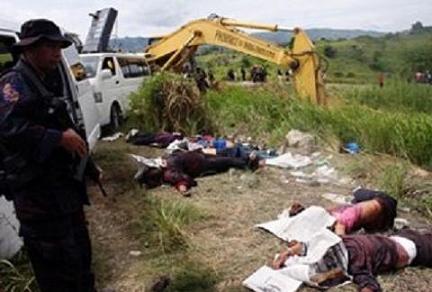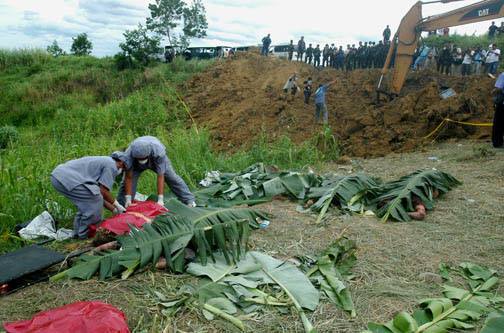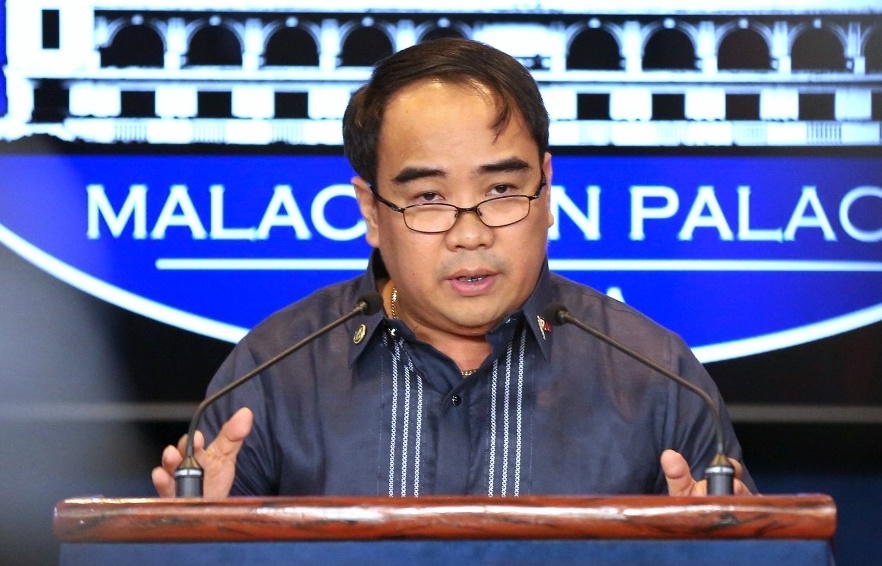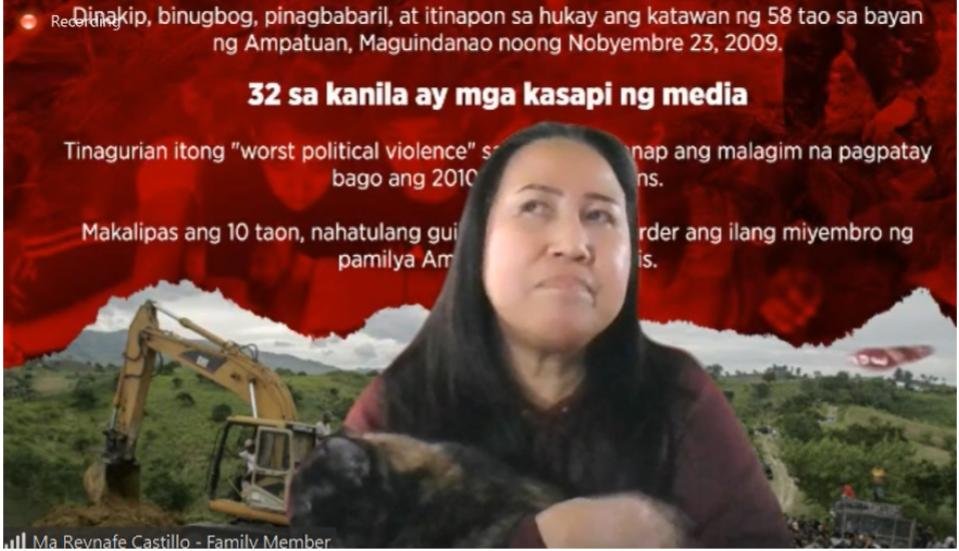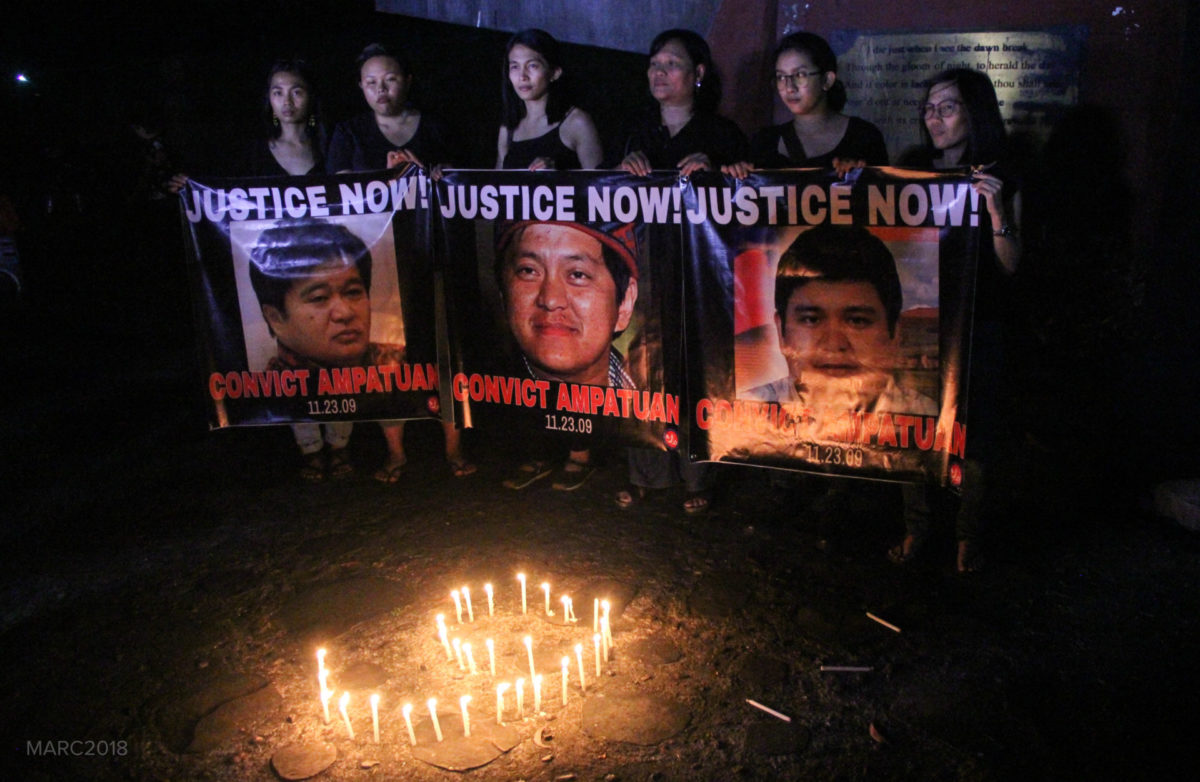By ELLEN T. TORDESILLAS
FIVE years ago, a crime so heinous was perpetrated by persons in authority, in a remote village in Maguindanao in Southwestern Mindanao.
Fifty-eight persons lay dead after Andal Ampatuan, Jr., mayor of Datu Unsay town and his men were through with their shooting spree. He then asked for a backhoe in the office of his father, Andal Ampatuan Sr., who was then governor of the province, to be brought to the crime scene to bury the dead bodies.
Among the dead was Genalyn Mangudadatu, wife of the political rival of the Ampatuans, Esmael “Toto” Mangudadatu, who was supposed to file the certificate of candidacy of her husband challenging the position of the Ampatuan patriarch.
Of the 58 victims, 32 were members of media, who were supposed to cover the political event.
Five years have passed and the families of the abominable crime are still in search of justice.
The National Union of Journalits in the Philippines has produced a moving video titled “Project Backhoe.” Please click to http://www.nujp.org/?p=3705.
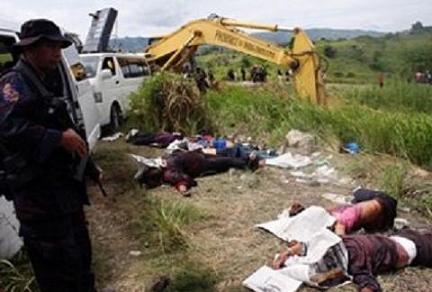 NUJP also laments even as the quest for justice for the 58 continues, the killing to bury the truth continues. Last week two potential witnesses were shot while they were riding a tricycle on their way to finalize their affidavit. Dennis Sakal, the former driver of Andal Jr., was killed and Sukarno Saudagal, a former bagman of Andal, Jr. was severely wounded.
NUJP also laments even as the quest for justice for the 58 continues, the killing to bury the truth continues. Last week two potential witnesses were shot while they were riding a tricycle on their way to finalize their affidavit. Dennis Sakal, the former driver of Andal Jr., was killed and Sukarno Saudagal, a former bagman of Andal, Jr. was severely wounded.
CenterLaw’s Harry Roque, who is counsel for 15 of the victims, called on President Aquino to fulfill the Philippine’s state obligations, under international law, to provide adequate reparations, including compensation and satisfaction, to the heirs of the victims of the Nov. 23 Maguindanao massacre.
“If the Philippine’s can pay 1.5 Million Pesos to the family of a Taiwanese fisherman shot dead by a Philippine coast guard patrol last 2013, why can’t the Philippines pay compensation with the same dispatch to journalists brutally murdered by Philippine state agents in the Maguindanao Massacre?” Roque said.
It is sad, Roque mused, that the Philippines discriminates against its own citizens, and reveals gross ignorance of its state obligations under international human rights law.
CenterLaw furthermore Aquino to adopt measures— including focused prosecution on the accused Ampatuan clan members, the arrest of all 79 Maguindanao massacre suspects at large and custody by the Witness Protection Program of prosecution witnesses—to expedite the prosecution of the Maguindanao massacre cases before his term ends on 30 June 2016.
It was Centerlaw, through the Roque & Butuyan Law Offices, which proposed the FIFO or “First in-First Out”. Under FIFO, the Trial Court may already render judgment on the case of any accused over whom all evidence – for and against – has already been heard. The FIFO concept was included by the Supreme Court in its guidelines for the Maguindanao massacre, and shall hopefully expedite the prosecution of the Maguindanao massacre cases.
The Center for Media Freedom and Responsibility (CMFR) in its statement, expressed dismay, over developments related to the Maguindanao massacre case.
CMFR’s statement:
“In a disturbing—and irony-ridden—demonstration of official hostility to the Constitutional guarantee of press freedom, the Philippine National Police (PNP) has prevented journalists from covering the trial of the alleged masterminds and perpetrators of the November 23, 2009 Ampatuan Massacre since August this year without justification, and without even informing the media who ordered the ban.
“Four journalists, meanwhile, were killed for their work in 2014, the fifth year since the worst attack on journalists in history occurred in Ampatuan town, Maguindanao province, bringing the total number of journalists killed for their work since Benigno Aquino III assumed the presidency to 25. It comes second to the 82 of the Arroyo administration which lasted nine years and included the Ampatuan Massacre victims.
“In this same year, President Aquino again claimed, once during the April visit of US President Barack Obama to the Philippines, and again in a radio interview before his September visit to several European countries, that not all the journalists killed were slain for their work, and that not only some but many were killed for reasons that if made public would be embarrassing to their families. But CMFR’s findings show that the number of work-related killings at 145 since the restoration of democracy in February 1986 to be a matter of grave concern.
“The ban on media coverage of the trial is an unconscionable assault on press freedom—the very right, so crucial to the state of democracy in this country. It is also an infringement on the public right to be informed on the proceedings of a trial whose outcome will be critical to the dismantling of impunity, or its persistence.
“Impunity—defined internationally as ‘the impossibility, de jure or de facto, of bringing the perpetrators of violations to account’—is what drives the continuing killing of journalists and media workers in the Philippines. Impunity allows the cycle of criminality to continue as it is the failure to break it with punishment, with penalty and the imposition of reparation. Impunity however applies especially to those with the means to hire lawyers who can use the judicial system to evade conviction and delay trials.
“Current data show 145 journalists and media workers out of 217 killed since 1986 were targeted for their work, and that any attempt to minimize the killings as assaults on press freedom makes ending the killings even more difficult. President Aquino would do well to reexamine the circumstances of the killings. CMFR has gathered enough information on every case to guide government reform and for the President to initiate policy action that will put a stop to the outrage that has severely damaged the country’s standing in the international community.
“The President should hold to review the prosecution of the trial to determine whether it reflects the political will to see this trial to a credible conclusion – the conviction of the guilty and cause the just compensation of the complainants. Attacks on witnesses will affect the trial; so far three witnesses have died. The President should call for urgent action to improve the protection of the witnesses who are critical to the success of the trial.
“Beyond that, President Aquino can also recall those recommendations, made as early as 2010, by the Freedom Fund for Filipino Journalists, Inc. (FFFJ), a coalition of the CMFR, the Kapisanan ng mga Brodkaster ng Pilipinas (KBP), the Philippine Center for Investigative Journalism (PCIJ), the Philippine Press Institute (PPI) and the Center for Community Journalism and Development (CCJD), that, among others, encourages the creation of a multi-sectoral quick response group to assist the PNP in obtaining relevant information whenever a journalist is killed.
“The killing of journalists and media workers has become an international concern, impinging as it does on the universal imperative of defending and enhancing the human right to disseminate and receive information. Ironic that in this, the fifth year since the worst attack on journalists and media workers in world history, it has not merited the same level of expressed concern from the Philippine government.”
The International Federation of Journalists (IFJ), which represents more than 600,000 journalists in 134 countries, has returned to the Philippines with an international delegation to investigate, together with the NUJP, the government’s efforts to secure justice for the victims of the massacre.
“President Benigno Aquino III’s failure to deliver a secure environment and enforce a respect for basic human rights cultivates an atmosphere that is deadly for journalists in the country,” IFJ said.
Anakbayan saidAquino’s statement about his frustration on the slow progress of the investigation and trial “is a mockery of justice for it is well known that the Aquino administration itself holds a big record in human rights violations.”
“We should not stop in calling for accountability both from the perpetrators of the crime, but also from the negligent state,” the group said.
